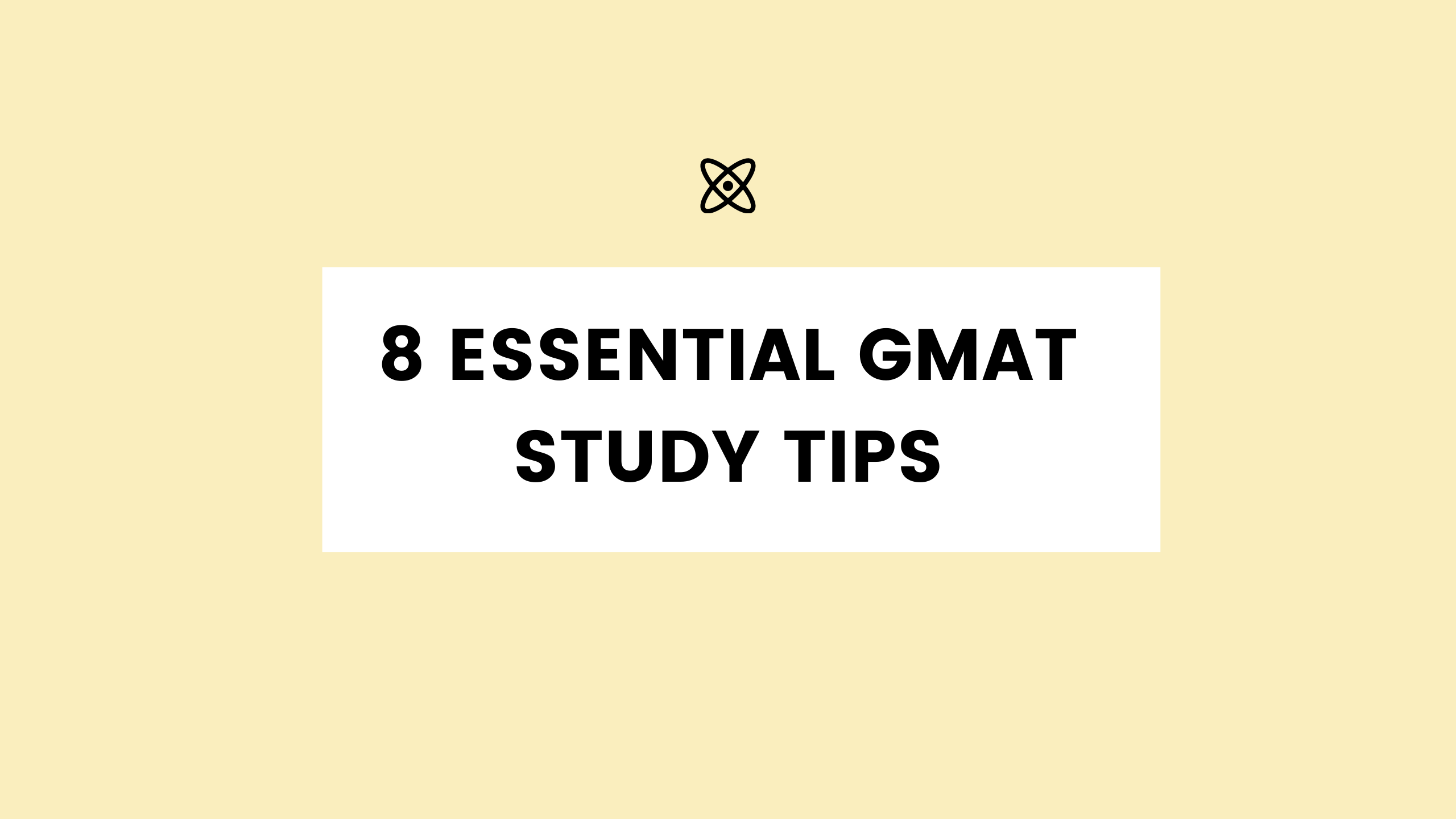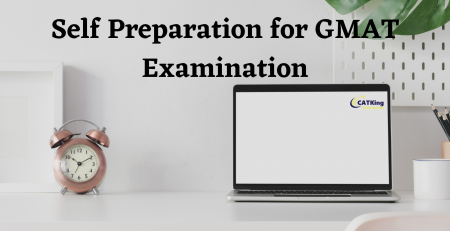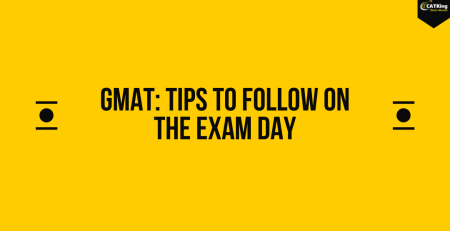8 Essential GMAT Study Tips
It’s anything but difficult to feel lost when you begin to study for the GMAT. It doesn’t help that everyone needs to share their own GMAT study tips—and half of those tips repudiate one another! Would it be advisable for you to consistently concentrate in a similar spot, or would it be advisable for you to switch things up? Do you get a 700 on the GMAT by tackling each official issue, or by perusing each investigation manage?

In light of a mix of learning science and GMAT experience, here are our most loved GMAT study tips. We’ve split them up into three classes:
GMAT study tips that mention to you what to examine
GMAT study tips that reveal to you how to contemplate
Study tips that reveal to you when to contemplate
To hit your GMAT objective score, you’ll need every one of the three!
GMAT Study Tips: What to Study
1. Pick a wellspring of authentic issues.
To pro the GMAT, you have to do GMAT issues. That is not one of our GMAT study tips—it’s simply the presence of mind! The genuine tip is that not all GMAT issues are made equivalent. The GMAC burns through a huge number of dollars building up every difficulty that shows up on the GMAT. Each new issue is tried as a trial issue with genuine test-takers before it gets utilized formally. Consider it GMAT quality control.
There are loads of extraordinary informal issues out there—we’ve composed a great deal of them for our GMAT practice tests! In any case, the official issues, which are real resigned GMAT questions, are the best quality level. Everyone ought to have a decent wellspring of authentic issues to work with.
At present, there are four spots to discover official GMAT issues. Here they are:
The Official Guide to the GMAT, which contains around 800 authority issues. As of this composition, the most recent adaptation is the 2019 version. Nonetheless, the more established forms contain a significant number of similar issues.
The Official Guide to Quantitative Review and the Official Guide to Verbal Review. These books are comparable in configuration to the Official Guide to the GMAT, however, they contain various issues.
The GMAT Official Practice Questions at mba.com. 90 inquiries are accessible for nothing, with the alternative to buy around 400 more.
GMAT Focus. This Quant-just apparatus gives up to 72 practice inquiries in 3 tests.
2. Pick an approach to gain proficiency with the substance.
To expert the GMAT, you need a solid establishment in math and punctuation, and you have to realize what the GMAT expects of you on each sort of issue. Here’s an elite of the abilities that are tried on GMAT Quant, and a comparative rundown for GMAT Verbal. You can’t become familiar with these things rapidly and totally by simply doing issues: you have to disguise the GMAT content in a sorted out manner.
One alternative is to take a 9-week GMAT Complete Course! You’ll see the entirety of the material that appears on the GMAT. And you’ll additionally be given the entirety of our GMAT Strategy Guides and a great deal of solid counsel on the best way to consider. If that isn’t for you, GMAT Interact likewise goes over all that the GMAT tests or you can buy the GMAT Strategy Guides independently. Look at our article on reading for the GMAT for additional thoughts and some valuable GMAT study tips.
3. Pick your training tests (yet don’t take too many practice tests.)
Practice tests probably won’t be as useful as you might suspect, in any event with regards to improving your GMAT shortcomings.
Here’s a model. Assume that you’re truly struggling with Data Sufficiency Testing Cases issues. On a 3-hour practice GMAT, you can hope to see around 13 Data Sufficiency questions. Of those, 33% of them may include testing cases—along these lines, that is around four issues. Of those four, one may be an expendable simple issue, and one more may be excessively hard. If testing cases are your greatest shortcoming at present, you simply invested three hours of your energy rehearsing two issues! Also, since you’re under pressure while taking a training test, you won’t recollect the material just as would be expected.
On the off chance that you have to chip away at a specific substance territory or ability (like testing cases), it’s far more effective to go through those three hours zeroing in exclusively on that region. Practice tests are additionally intellectually burdening, implying that they’ll leave you drained (and wasteful) for a day or two a short time later. Besides, the quantity of incredible GMAT practice tests is restricted.
GMAT Plan
All things considered, practice tests are as yet significant. You should take one each couple of weeks to assess how your examination is going and to choose what to zero in on straightaway. Also, if you have a shortcoming that explicitly identifies with stepping through a full exam, for example, uneasiness or timing issues, a training test can help.
Picking an extraordinary practice test is a difficult exercise. The GMAC has distributed six authority practice tests that utilization resigned GMAT issues. In any case, these training tests don’t accompany a ton of instruments and information to examine your exhibition. Then again, the Manhattan Prep practice tests are created by teachers with huge amounts of GMAT experience. Furthermore, incorporate an itemized examination. If you decide to do both, you might need to utilize the Manhattan Prep tests before your investigations and change to the GMATPrep ones when you’re nearer to your official test date.
GMAT Study Tips: How to Study
Our initial three GMAT study tips mentioned to you what to examine, and that is a decent beginning. In any case, we aren’t brought into the world realizing how to contemplate. Truth be told. A great deal of us has misguided judgments about the most ideal approaches to learn. Here are some GMAT tips that will assist you in concentrating the correct way.
1. Study like a performer.
Music, chess, and sports have been around for any longer than the GMAT, and specialists in these fields have spent innumerable hours pondering on the most ideal approach to rehearse. This 1993 paper summarizes everything as purposeful practice. If you need to improve, carelessly playing a tune again and again or tossing a ball against the divider isn’t sufficient. Nor is thoughtlessly doing GMAT issues:
Simple reiteration of action won’t consequently lead to progress in, particularly, the precision of execution.
Rather, practice ought to be focused on. You won’t become a baseball master exclusively by playing bunches of ball games, and you won’t become a GMAT master by stepping through heaps of training exams. Locate a particular shortcoming and spotlight on it totally for a short time.
During a 3-hr ball game, a player may get just 5-15 pitches (maybe a couple of applications to a specific shortcoming), while during the ideal act of a similar span, a hitter working with a committed pitcher has a few hundred batting openings, where this shortcoming can be methodically investigated (T. Williams, 1988).
Practice ought to likewise be objective situated. Try not to go into a training meeting without comprehending what you’re attempting to accomplish. Ensure that whatever you’re doing. It’s intended to assist you with improving something explicit.
As opposed to playing, conscious practice is a profoundly organized movement. The express objective of which is to improve execution. Explicit assignments are developed to beat shortcomings. And execution is painstakingly observed to give prompts to approaches to improve it further.
Specialists at music, chess, or baseball are likewise master practicers. To turn into a specialist at the GMAT, you should turn into a specialist practicer as well.
2. Set your cerebrum to work.
On the off chance that you ever stared at the TV during the 90s, you presumably observed plugs for those vibrating belts that would as far as anyone knows give you rock-hard abs. You simply needed to tie the belt around your abdomen, plug it in, and sit on the love seat while it accomplished all the work. To no one’s shock, they didn’t work. Notably, on the off chance that you need extraordinary abs, you need to accomplish the difficult work yourself.

Concentrating by inactively perusing, watching, or listening is somewhat similar to utilizing one of those belts. At the point when you simply read the clarification of a GMAT issue—regardless of whether it’s a great clarification, and regardless of whether you thoroughly get it—you’re letting another person accomplish the difficult work for you. Whoever composed that clarification is doing the greater part of the reasoning, while you’re kicking back and relaxing. What’s more, no one ever beat the GMAT by relaxing!
Improve your GMAT scores with CATKing
The equivalent is genuine when you simply read a part out of our Strategy Guides without blending the material yourself, or when you watch an Interact exercise without working through the issues. Rather than attempting to adapt inactively, challenge yourself to do however much of the difficult work as could be expected. Try not to peruse the clarification until you’re certain beyond a shadow of a doubt you’ve made sense of all that you can all alone. Also, in case you’re completely bewildered by an issue, the arrangement isn’t to examine the clarification bit by bit until you can tackle it.
The best approach to “win” that issue might just be to figure out how to perceive comparative issues so you can figure on the next time. On the off chance that it’s a simpler issue and you just got lost by it, center around finding the signs in the content that would have revealed to you which way to deal with taking. Ensure you’re rewording things in your own words in your mistake log. Furthermore, on the off chance that you aren’t sure how to manage an issue. Start a discussion about it at our GMAT gathering!
Here’s an article from GMAT educator Stacey Koprince that goes into the dynamic audit measure inside and out.
3. Go past “I get it.”
On the GMAT, you don’t get the chance to show your work. From the PC’s viewpoint, you either got the difficult right or you failed to understand the situation. The test can’t differentiate between someone who didn’t comprehend the issue at all and someone who got 99.9% of the route there, yet made a solitary little mistake at the end.
That can be truly baffling. You can read for the GMAT for quite a long time and become familiar with a huge amount of material however just observe an unassuming enhancement for training tests. The issue is, the test itself can’t tell that you’ve taken in the material. Until you’ve learned it so well that you can dependably get issues right. That is significantly harder than simply learning until you “get it,” or learning until you can track with a class or an Interact exercise.
Long story short, don’t let yourself put down a theme once you feel as though you ‘get it.’ Continue concentrating on even the material that you think you comprehend until you’re reliably performing admirably on that point when you take practice tests. (Incidentally, here’s the way to examine a training test.)
GMAT Study Tips: When to Study
Would it be a good idea for you to concentrate somewhat consistently, or would it be advisable for you to pack? Would it be a good idea for you to consider Geometry now and leave Number Properties until some other time? These GMAT study tips will assist you with choosing which study meetings to do when.
1. Interleaving as opposed to impeding.
“Interleaving” and “impeding” allude to two diverse examination styles. In hindered contemplating, you pick a point, at that point study that solitary theme until you’ve depleted your examination materials and raised your certainty. In interleaved considering, you do short examination meetings on every subject over a time of days or weeks, blending in various themes meanwhile. You won’t ace the theme after the primary meeting, yet you’ll build your capacities somewhat each time you return to it.
Impeded examining resembles eating an entire group of brownies. It feels incredible at that point. Be that as it may, later on, you’ll feel debilitated and (surprisingly more terrible) you’ll be all out of brownies. Interleaved considering is more similar to eating one brownie every night until the group is no more. It’s irritating to need to leave the rest of the brownies when they’re calling your name—yet over the long haul, you’ll feel way better.
That is because of your mind blossoms with two things: overlooking and assortment. Overlooking is inescapable, regardless of what you do. Regardless of whether you thoroughly ace a subject. You’ll overlook a great deal of what you realized. In any case, when you mostly overlook and afterward re-pick up something, you end up with a more grounded, more industrious memory. You should construct that overlooking/re-learning measure into your concentrating at this moment.
Your mind cherishes assortment almost as much as it adores overlooking things. The more various information sources you give it, the more grounded recollections you’ll frame. For example, did you realize that “consistently concentrate in a similar spot” is really a fantasy? Much the same as exchanging up subjects every day. Exchanging up your investigation area will give you more grounded mental affiliations.

2. Influence the “overlooking element.”
Overlooking is irritating however inescapable. Then again, re-getting the hang of something you’ve overlooked is incredible. You can utilize this for your potential benefit through something many refer to as dispersed redundancy.
Here’s the ticket. You get another (or old) point and go through an hour or two considering it. Do something very similar the next day. Shouldn’t feel “completed” with the subject now! Regardless, hold up a couple of days before picking it back up. The thought is that you’ll overlook—and need to re-learn—some of what you considered.
At that point, stand by longer before you audit the theme a third time—possibly a week or somewhere in the vicinity. After doing that, hold up a little while. Or even a month. Each time you somewhat overlook, and re-realize, what you’ve realized, you’ll structure a more grounded memory. Furthermore, more grounded recollections are the ones that stay with you on test day.
The two standards of divided reiteration are:
Various short investigation meetings are scattered. Rather than all lumped together
Expanding the measure of time you hold up before checking on a theme, to prepare your cerebrum to recall it for more and more
Would you be able to figure out how to consolidate those into your examination plan?
GMAT Study Tips: Summary
You don’t need to concentrate consummately, every day. Nonetheless, there are certainly some little upgrades that you can make to how you’re moving toward the GMAT. Certain methods of examining—like obstructing, or attempting to retain a ton of substance at the same time—can appear to be fulfilling. And they may even function admirably temporarily. However, acing the GMAT isn’t something that occurs without any forethought. And extraordinary examining is tied in with moving towards your drawn-out objectives. On the off chance that you need to make it to your objective score, invest some energy forthright on figuring out how to examine. On the off chance that you do, you’ll get more out of every hour you put in. ?
All the best!!














Leave a Reply
You must be logged in to post a comment.